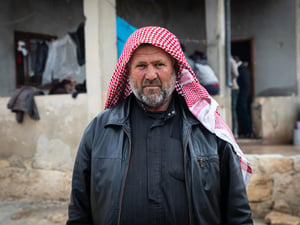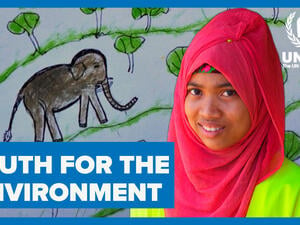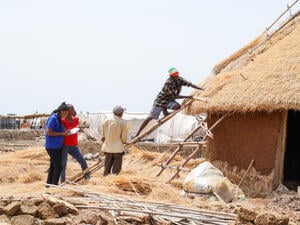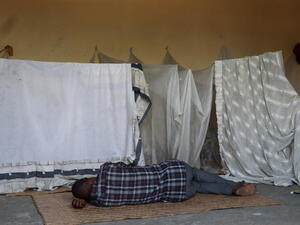Shelter urgently needed for Rohingya fleeing Myanmar violence
Shelter urgently needed for Rohingya fleeing Myanmar violence

Rohingya refugees arrive in Bangladesh after crossing the border with Myanmar.
KUTUPALONG CAMP, Bangladesh – Barefoot and running for her life, Rohingya Dilara, 20, reached Bangladesh in recent days clutching her young son, her family torn apart by violence in Myanmar.
“My husband was shot in the village. I escaped with my son and in-laws,” said Dilara, 20, as she trudged on mud-caked feet into Kutupalong refugee camp on Friday. “We walked for three days, hiding when we had to. The mountain was wet and slippery and I kept falling.”
An estimated 73,000 women, children and men like Dilara and her son have arrived in Bangladesh after trekking for days to flee violence in Myanmar’s northern Rakhine state. Many are hungry, in poor physical condition and in need of life-saving support.
In the last few days, large groups of Rohingya have been crossing into the Ukhiya and Teknaf areas of south-eastern Bangladesh bordering Myanmar. Many were seen wading through vast rice fields and making their way to the nearby villages carrying whatever they could salvage from their homes.
"This is a true crisis ... Every family has taken in new arrivals, every available space is occupied. I’m not sure how long we can sustain this.”
Dilara lost track of her in-laws during the journey and followed her fellow villagers to the camp. “I don’t know where I am … I just knew to run to save my life,” she said in a daze, carrying her 18-month toddler and nothing else.
With nowhere to go, many of the new arrivals are being directed to the existing refugee camps that were established in the 1990s.
Kutupalong camp has received an estimated 20,000 new arrivals since the latest violence in northern Rakhine state erupted early on August 25. Another camp, Nayapara, has received an estimated 6,500. Other new arrivals are scattered in makeshift sites and local villages.
“This is a true crisis,” said Mohammad Abul Kalam, Refugee Relief and Repatriation Commissioner in Cox’s Bazar, Bangladesh. “The number of people has more than doubled in the camps. Kutupalong camp is beyond capacity. Every family has taken in new arrivals, every available space is occupied. I’m not sure how long we can sustain this.”

New arrivals struggle to find space in the already-overcrowded Kutupalong camp.
In both Kutupalong and Nayapara camps, the new arrivals are being put up in communal buildings such as schools, community centres and madrassas. In coordination with the authorities, UNHCR, the UN Refugee Agency, and its partners have also set up some tarpaulin-covered structures in the camps to provide temporary shelter. But even these facilities are reaching saturation point.
“These people are hungry, thirsty and sick after their terrible ordeal. They deserve at least a roof over their heads,” said Shubhash Wostey, UNHCR’s head of office in Cox’s Bazar. “As thousands more arrive every day, we need emergency shelters and additional land to build them on.”
Other urgent needs include food – some have not eaten in days, surviving only on rain and groundwater during their journey – and medical treatment.
Agencies like the World Food Programme and Action Against Hunger have been providing high-energy biscuits and hot meals to the new arrivals. Refugee volunteers have also set up community kitchens to meet the growing needs.
“As thousands more arrive every day, we need emergency shelters and additional land to build on.”
Khaleda, 26, is one of the refugee volunteers. She runs a community kitchen out of her hut in Kutupalong camp, serving rice, lentils, potatoes and occasionally fish to 400 new arrivals every day.
“They came with nothing,” said the English teacher who was born in exile. “They need everything. I want to help them and am giving away as much as I can.”
UNHCR is working closely with the local authorities and refugee volunteers to identify vulnerable new arrivals – including those who need medical attention – and refer them to health services inside the camp. More serious cases are referred to the local hospitals.
Prior to the current influx, Bangladesh was already hosting nearly 34,000 registered Rohingya refugees in Kutupalong and Nayapara camps, as well as several hundred thousand undocumented Rohingya living in makeshift sites and local villages.
UNHCR continues to advocate for the registration of the new arrivals and undocumented Rohingya in Bangladesh in order to target assistance to those who need it most.









